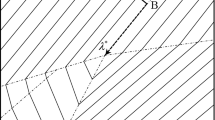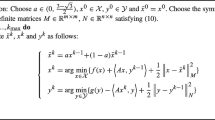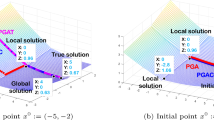Summary.
We introduce a new algorithm for the solution of the mixed complementarity problem (MCP) which has stronger properties than most existing methods. In fact, typical solution methods for the MCP either generate feasible iterates but have to solve relatively complicated subproblems (like quadratic programs or linear complementarity problems), or they have relatively simple subproblems (like linear systems of equations) but generate not necessarily feasible iterates. The method to be presented here combines the nice features of these two classes of methods: It has to solve only one linear system of equations (of reduced dimension) at each iteration, and it generates feasible (more precisely: strictly feasible) iterates. The new method has some nice global and local convergence properties. Some preliminary numerical results will also be given.
Similar content being viewed by others
Author information
Authors and Affiliations
Additional information
Received August 26, 1999 / Revised version recived April 11, 2000 / Published online February 5, 2001
Rights and permissions
About this article
Cite this article
Kanzow, C. Strictly feasible equation-based methods for mixed complementarity problems. Numer. Math. 89, 135–160 (2001). https://doi.org/10.1007/PL00005460
Issue Date:
DOI: https://doi.org/10.1007/PL00005460




